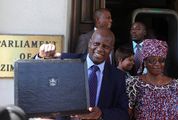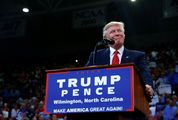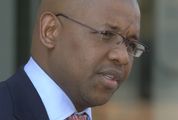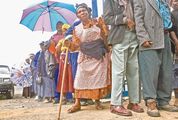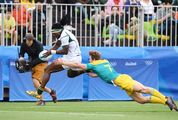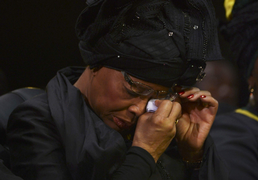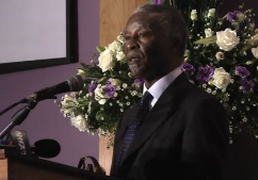WE HAVE long been aware that this moment would come, and that it would be painful and difficult. While we mourn the passing of Rolihlahla Dalibhunga Mandela, we also feel the need to celebrate his extraordinary personality and his exceptional life. He has given us joy; he has bequeathed upon us his wisdom; and he has made us proud.
We reflect joyfully upon his life and his achievements, and we are grateful that this country and this continent gave birth to him and nurtured him to unbelievable heights of greatness.
To the world, Nelson Mandela will forever be remembered for the momentous achievements of a great life.
For those who had the privilege to know and work with him, it is more likely the small things that will remain etched in memory.
It may be a particular conversation, a private joke, a handshake greeting, an idiosyncrasy, that will stand out when we recall this African giant. It may be the intonation in his voice as he gently chided one for being late, or the look in his eyes when he spoke about his childhood in rural Transkei.
For Mandela was at his core merely human. And therein lay much of his greatness. It was this that enabled him to so clearly perceive the human condition.
It was this that enabled him to see in all people the potential for change, growth and goodness. And it was his essential humanity that accounts for the depth of admiration, loyalty and love that he commanded from his people, and from others across the globe.
It is this essential humanity that today accounts for the profound sorrow that has overtaken our nation and indeed many people of the world, for the deep sense of loss that each of us feels, as if a cherished member of our family had just breathed their last.
As we struggle to come to terms with our collective pain and loss, we draw solace and strength from a life so rich in its living, and so significant in its impact and consequence.
We are comforted by the knowledge that Mandela’s legacy survives in the beating heart of the nation he helped to forge. It survives in the steely determination of a diverse people united in a common effort to build a better future; a future free from the fetters of prejudice, ignorance and want.
Mandela’s legacy survives in us.
We mourn his passing, but also celebrate.
We celebrate a life lived in untiring service of his people. We do so, grateful that we had an opportunity to be led by one of such vision, such humanity, and such forbearance.
In remembering Mandela, it is easy to forget that his role in the liberation of our nation was neither predetermined nor inevitable. It was the consequence of a sustained collective struggle and an unparalleled international effort to bring down one of the most iniquitous systems of the 20th century.
It was a remarkable confluence of factors that decided Mandela’s role in history — notably, a conscious decision by his comrades that he should become the pre-eminent symbol of defiance and hope, coupled with his remarkable political skill and unassailable integrity.
Mandela himself acknowledged that the trajectory of his political development took many a detour.
The stories he told of his early intolerance of communists, and particularly his involvement in breaking up meetings, were meant to illustrate not only the foolish notions of his political youth, but the dangers of a mind that would close itself off to fresh ideas and alternative perspectives.
The evolution of his political consciousness, he suggested, was reflective of a broader experience within the movement.
Of course, Mandela cannot be separated from the others of his generation. He became a great leader because of their influence, counsel and example.
Were it not for the likes of Walter Sisulu and Oliver Tambo, one wonders whether Mandela would have become the Mandela the world came to know and admire.
What Mandela learnt he was adept at passing on to others. We learned a lot from him, about politics, about leadership, about compassion, and about forgiveness.
He taught us about the efficacy of settling disputes through negotiation and the art of negotiation.
After spending years negotiating on behalf of mineworkers I thought I knew everything about negotiations. But I had to meet Madiba to discover that I was a mere beginner. It was a real privilege to learn the art, strategy and tactics of negotiating from Madiba the master.
One of his greatest strengths was to understand the person on the other side of the table, not only what their strengths and weaknesses were, but also what motivated them, what they feared, and what they needed. Even as he was talking to those responsible for great suffering and violence, he retained his confidence in their ability to see sense and to mend their ways. The cynicism of the apartheid establishment was met by his supreme trust in the inevitable triumph of human decency.
He was endowed with a sharp strategic mind that enabled him to have great foresight. Mandela had the courage to lead from the front and the wisdom to take risks when he saw opportunities for strategic advances.
He went to great lengths to explain his decisions where prior consultation was not possible, and made every effort to ensure that he did not go down any road that his constituency was not prepared to follow.
Mandela’s confidence derived in part from his ability to listen, to consider various views, and to weigh the merits of each. He was then able to take decisions that were informed and considered.
He was a leader who always appreciated the views of those who held different opinions to his. He saw them not as a threat, but as an opportunity to test his ideas and to hold them up to the glare of critical scrutiny.
His humility is legendary. But he could be stubborn. Yet he was never conceited; nor did he display the arrogance that so often accompanies power. He was prepared to acknowledge his own shortcomings, and admit when he was wrong.
As we pay tribute to Mandela, we must acknowledge that he paid a heavy personal price for his commitment to the struggle. His willingness to sacrifice so much, even to risk his life, remains an enduring inspiration to so many. We must acknowledge with appreciation how his family suffered over many years so that he may able to lead his nation to freedom. We will remain forever in their debt.
Nelson Mandela is gone.
But his memory lives on in the heart of every South African and in the heart of every person who cherishes freedom and justice.
He leaves a precious legacy for future generations; a legacy that we are bound through tireless effort to enhance and to preserve in perpetuity.
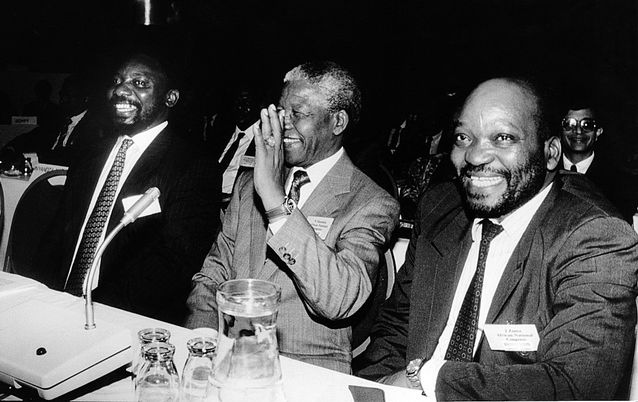
Cyril Ramaphosa, Nelson Mandela and Jacob Zuma at Codesa talks, circa 1993. Picture: TIMES MEDIA
WE HAVE long been aware that this moment would come, and that it would be painful and difficult. While we mourn the passing of Rolihlahla Dalibhunga Mandela, we also feel the need to celebrate his extraordinary personality and his exceptional life. He has given us joy; he has bequeathed upon us his wisdom; and he has made us proud.
We reflect joyfully upon his life and his achievements, and we are grateful that this country and this continent gave birth to him and nurtured him to unbelievable heights of greatness.
To the world, Nelson Mandela will forever be remembered for the momentous achievements of a great life.
For those who had the privilege to know and work with him, it is more likely the small things that will remain etched in memory.
It may be a particular conversation, a private joke, a handshake greeting, an idiosyncrasy, that will stand out when we recall this African giant. It may be the intonation in his voice as he gently chided one for being late, or the look in his eyes when he spoke about his childhood in rural Transkei.
For Mandela was at his core merely human. And therein lay much of his greatness. It was this that enabled him to so clearly perceive the human condition.
It was this that enabled him to see in all people the potential for change, growth and goodness. And it was his essential humanity that accounts for the depth of admiration, loyalty and love that he commanded from his people, and from others across the globe.
It is this essential humanity that today accounts for the profound sorrow that has overtaken our nation and indeed many people of the world, for the deep sense of loss that each of us feels, as if a cherished member of our family had just breathed their last.
As we struggle to come to terms with our collective pain and loss, we draw solace and strength from a life so rich in its living, and so significant in its impact and consequence.
We are comforted by the knowledge that Mandela’s legacy survives in the beating heart of the nation he helped to forge. It survives in the steely determination of a diverse people united in a common effort to build a better future; a future free from the fetters of prejudice, ignorance and want.
Mandela’s legacy survives in us.
We mourn his passing, but also celebrate.
We celebrate a life lived in untiring service of his people. We do so, grateful that we had an opportunity to be led by one of such vision, such humanity, and such forbearance.
In remembering Mandela, it is easy to forget that his role in the liberation of our nation was neither predetermined nor inevitable. It was the consequence of a sustained collective struggle and an unparalleled international effort to bring down one of the most iniquitous systems of the 20th century.
It was a remarkable confluence of factors that decided Mandela’s role in history — notably, a conscious decision by his comrades that he should become the pre-eminent symbol of defiance and hope, coupled with his remarkable political skill and unassailable integrity.
Mandela himself acknowledged that the trajectory of his political development took many a detour.
The stories he told of his early intolerance of communists, and particularly his involvement in breaking up meetings, were meant to illustrate not only the foolish notions of his political youth, but the dangers of a mind that would close itself off to fresh ideas and alternative perspectives.
The evolution of his political consciousness, he suggested, was reflective of a broader experience within the movement.
Of course, Mandela cannot be separated from the others of his generation. He became a great leader because of their influence, counsel and example.
Were it not for the likes of Walter Sisulu and Oliver Tambo, one wonders whether Mandela would have become the Mandela the world came to know and admire.
What Mandela learnt he was adept at passing on to others. We learned a lot from him, about politics, about leadership, about compassion, and about forgiveness.
He taught us about the efficacy of settling disputes through negotiation and the art of negotiation.
After spending years negotiating on behalf of mineworkers I thought I knew everything about negotiations. But I had to meet Madiba to discover that I was a mere beginner. It was a real privilege to learn the art, strategy and tactics of negotiating from Madiba the master.
One of his greatest strengths was to understand the person on the other side of the table, not only what their strengths and weaknesses were, but also what motivated them, what they feared, and what they needed. Even as he was talking to those responsible for great suffering and violence, he retained his confidence in their ability to see sense and to mend their ways. The cynicism of the apartheid establishment was met by his supreme trust in the inevitable triumph of human decency.
He was endowed with a sharp strategic mind that enabled him to have great foresight. Mandela had the courage to lead from the front and the wisdom to take risks when he saw opportunities for strategic advances.
He went to great lengths to explain his decisions where prior consultation was not possible, and made every effort to ensure that he did not go down any road that his constituency was not prepared to follow.
Mandela’s confidence derived in part from his ability to listen, to consider various views, and to weigh the merits of each. He was then able to take decisions that were informed and considered.
He was a leader who always appreciated the views of those who held different opinions to his. He saw them not as a threat, but as an opportunity to test his ideas and to hold them up to the glare of critical scrutiny.
His humility is legendary. But he could be stubborn. Yet he was never conceited; nor did he display the arrogance that so often accompanies power. He was prepared to acknowledge his own shortcomings, and admit when he was wrong.
As we pay tribute to Mandela, we must acknowledge that he paid a heavy personal price for his commitment to the struggle. His willingness to sacrifice so much, even to risk his life, remains an enduring inspiration to so many. We must acknowledge with appreciation how his family suffered over many years so that he may able to lead his nation to freedom. We will remain forever in their debt.
Nelson Mandela is gone.
But his memory lives on in the heart of every South African and in the heart of every person who cherishes freedom and justice.
He leaves a precious legacy for future generations; a legacy that we are bound through tireless effort to enhance and to preserve in perpetuity.



